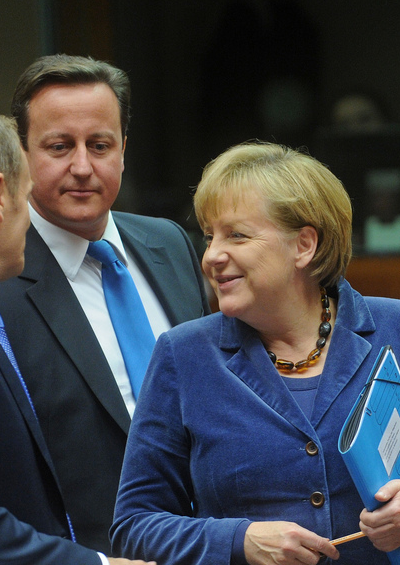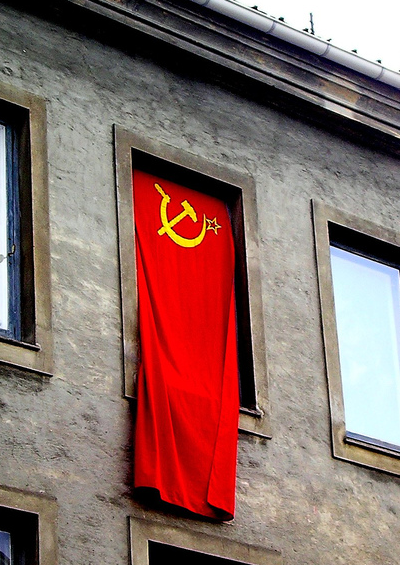Where Is David Cameron?
Exploring Britain’s disappearance as a geopolitical player.
February 17, 2015

“Where is David Cameron?” asks Germany’s influential Frankfurter Allgemeine Zeitung (FAZ). The German paper is leading a chorus of cruel comments about how the British prime minister “shines by his absence on the international stage.” That’s how Le Figaro, the center-right paper in France, ungallantly headlined a report on Britain’s disappearance as a geopolitical player.
“‘The British prime minister is rarely absent when cameras are around. That’s why it is all the more striking that European foreign policy is taking shape without him. In the diplomatic struggle with Moscow, Berlin and Paris lead for Europe, while Washington listens carefully from across the Atlantic.”
But the government in London that was once the mentor for Eastern Europe can “hardly be seen or heard,” continued the FAZ correspondent in London.
Left on the sidelines
In Le Monde, the paper’s editorial director, Sylvie Kauffmann, says the reason for David Cameron’s absence from high-level European diplomacy is that, “Great Britain has been left on the sidelines because of its threat of Brexit — Britain exiting the European Union. Mrs. Merkel is managing the Russia-Ukraine conflict principally as a European issue. In that context, to have to rely on Mr Cameron would weaken her. In fact, British diplomacy shines by its absence in the Ukraine dossier.”
The British prime minister has claimed — or at least his aides have spun it that way — that he has a special relationship with Mrs. Merkel.
Le Monde’s editorial director thinks differently. She argues that Mrs. Merkel has switched to François Hollande, a line that is confirmed by senior French diplomats in private conversations.
Ms. Kauffmann, who knows Berlin well, says that this reborn Franco-German axis “is serious. The attacks in Paris, Mrs. Merkel’s ungrudging solidarity and the way Hollande handled the event has brought the two leaders together.”
In the French cabinet meeting last week, the French foreign minister, Laurent Fabius, was openly critical of Britain’s non-diplomacy in Europe.
His intervention sparked criticisms from other ministers, including the Finance Minister Michel Sapin, who complained about the habit of the UK Chancellor George Osborne’s non-stop criticism of the Eurozone and its handling of the Greek crisis.
An awakening in Europe
These attacks from across Europe on David Cameron’s lack of policy on Europe are without precedent. They represent the gradual awakening across the Channel that Mr. Cameron’s proposed In-Out EU referendum — an irrevocable pledge if he retains power — is likely to lead to Brexit, Britain quitting the EU.
Why invest much time in a relationship if in a couple of years Britain will no longer be in the EU?
In Britain, two recently retired generals have taken the unusual step of publicly criticizing the prime minister. On BBC News, General Sir Richard Shirreff deplored David Cameron’s absence from team Europe’s efforts to try and stop Ukraine sliding into unstoppable conflict.
“The UK is a major NATO member, it is a major EU member, it is a member of the UN Security Council, and it is unfortunate that the weight that the British prime minister could bring to efforts to resolve this crisis appears to be absent.” General Shirreff called his prime minister a “bit player” and a “foreign policy irrelevance.”
Those are strong words, especially considering that, until 2014, Sir Richard was the UK’s highest-ranking NATO commander. He was echoing the criticism from General Jonathan Shaw who commanded Britain’s Special Forces (SAS).
In his new book Britain in a Perilous World (Haus Books), he describes David Cameron as a prime minister seemingly “more interested in the instant gratification of action rather than the tedious discipline of deep, coherent thought.” Ouch.
Criticism from within
Unlike in the United States — where outspoken generals once out of the military are commonplace — British senior army officers usually maintain a stiff-upper-lip silence about their political masters.
That these two admired military commanders have separately made the same kind of criticism of the prime minister as newspaper editors on the European continent shows just how low Britain’s diplomatic status has sunk even in the eyes of senior Brits at the heart of the British state machinery.
“‘The British Giant shrinks to Little England” is how Germany’s Die Welt sees Cameron’s new isolationism. The paper’s veteran London correspondent, Thomas Kielinger, is an Anglophile who taught at British universities and is author of a well-received Churchill biography, which is selling well in Germany.
But he asks “What will happen with the referendum on the EU Cameron promised in 2017? Uncertainty, thy name is the United Kingdom.”
Dwindling power
This is also true of the British in security policy. The size of the British army is reduced by current plans to 82,000 men — which can be comfortably accommodated in Wembley Stadium.
“A single British aircraft carrier currently holds vigil on the seas — there is no more question of ‘Britannia rules the waves.’ In the 1991 the Gulf War, the Royal Air Force had 31 squadrons. Now there are only eight. This explains why the British contribution to the air war against the Islamic State amounts to just 6% of all sorties flown,” Kielinger writes.
The paper concludes that Cameron — and by implication his country — does not matter anymore on the European stage.
True or not, the judgment is the harshest passed on a British prime minister in decades from so many who are friends of Britain and do not want to see the country slowly vanish as an international player.
Takeaways
German and French newspapers alike ask, “Where is David Cameron?”
The government in London, once the mentor of Eastern Europe, can “hardly be seen or heard.” #Ukraine
Even British generals now criticize David Cameron for his passive approach to foreign policy.
In the face of Brexit, does the UK still have a place on the European stage?

